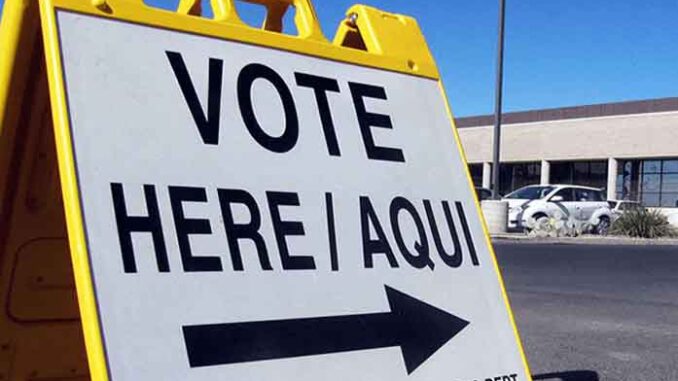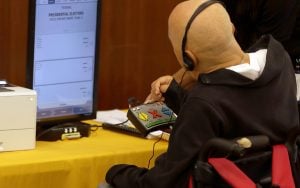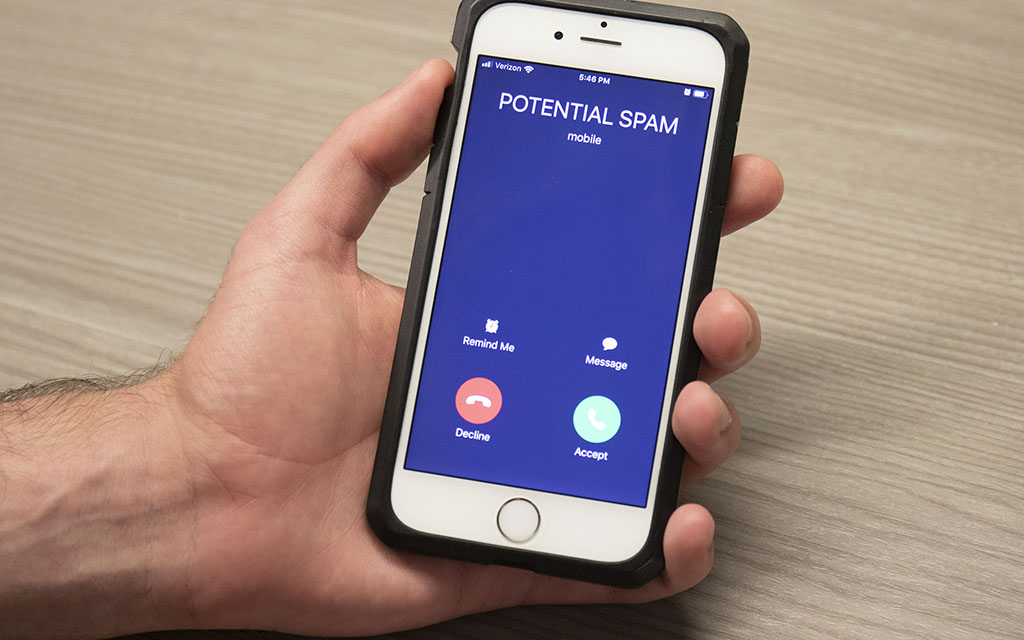
By Joshua Shimkus
PHOENIX – Angelina Montgomery tapped experimentally at the controls of an accessible voting device, trying to master the mechanics of casting her ballot on Tuesday.
The ImageCast X machine is designed so people with disabilities can vote in person and in private. Using a standard voting machine is difficult for Montgomery, who has neuromyelitis optica, a condition in which the immune system attacks the spinal cord and optic nerves.
Every polling location in the state is required to have machines that can be used by voters with disabilities. Maricopa County uses the ImageCast X system, made by Dominion Voting Systems.
To get some practice using one, Montgomery and her service dog, Remy, attended an event last week hosted by Ability360, an independent living center in east Phoenix. The center provided the device and some advice to disabled residents on what to expect and what they are entitled to on Election Day.
The machine has a touch screen, a large-print option and audio ballots in multiple languages. It also can be adapted to be used with sip-and-puff mechanisms, assistive technology that uses air exhaled from the user’s mouth to control devices. Polling places also must have magnifying equipment and train poll workers to assist people with disabilities.

The ImageCast X machine has a touch screen, a large-print option and audio ballots in multiple languages. It also can be adapted to be used with sip-and-puff mechanisms. (Photo by Justin Spangenthal/Cronkite News)
Although it was Montgomery’s first time on the machine, she said she now feels comfortable enough to vote in person. Before the demonstration, “I didn’t know they had accessible voting,” she said.
Montgomery is one of the estimated 38 million eligible voters in the United States who have a disability, according to the Government Accountability Office. That makes it one of the largest voting blocs in the country, but disabled voters have a lower turnout rate than voters without disabilities.
April Reed, vice president of advocacy at Ability360, said Maricopa County generally does a good job accommodating people with disabilities at the polls. But having access to accommodations and knowing how to utilize them are two different things, she said.
“Oftentimes, it’s not about the access not being there, it’s the ability to use it,” Reed said. For example, “The (accessibility voting) machine was there, but it wasn’t turned on and there was a wait, or someone tried to use it and got an error message.”
Megan Gilbertson, communications director for Maricopa County Elections, said the state’s most populous county offers other options that make it easier for disabled residents to vote. These include curbside voting at polling places, permanent early voting, and Special Election Boards that will send someone to voters’ homes to assist with ballots if they can’t get to a polling place.
“It’s something that we’re really proud of – that we’re able to provide all of these different options both in English and in Spanish to serve voters and to meet them where they are,” Gilbertson said.
Michael Sullivan Jr. was another voter who tried out the accessible voting machine last week at Ability360. He said he already had submitted his mail-in ballot, but as a paraplegic with limited use of his arms, he’s motivated to let others with disabilities know that different accommodations exist.
“My plan is that, now that I’ve seen these other choices, maybe I’ll go and try some of these out in the future,” he said. “I guess you can come up with your own reasons not to vote, but these barriers are coming down.”
For more information on disabled voting in Maricopa County, visit the county’s website or contact Special Elections Boards by phone at 602-506-1511 or by email at SEB@risc.maricopa.gov.

